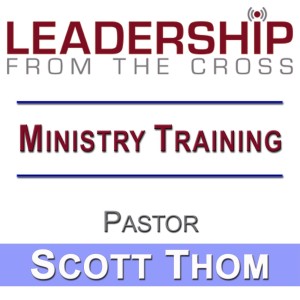The Dangers of Consumer-driven Ministry
 I am a consumer. I love nice things. I love new products, the shinier the gadget, the better. I also really like good service, and I really like to be entertained. So, when you are able to entertain me with the presentation of a new service or new shiny product…I am sold. Ask my wife. She will tell you, without her voice of reason we would be dead broke, and I would be swimming in a sea of finely bound Bibles, Apple products and Filson gear. I am not unique in this; I am simply a product of the society we live in.
I am a consumer. I love nice things. I love new products, the shinier the gadget, the better. I also really like good service, and I really like to be entertained. So, when you are able to entertain me with the presentation of a new service or new shiny product…I am sold. Ask my wife. She will tell you, without her voice of reason we would be dead broke, and I would be swimming in a sea of finely bound Bibles, Apple products and Filson gear. I am not unique in this; I am simply a product of the society we live in.
The western world is a consumeristic, capitalistic and materialistic society.
With that in mind, I think we would agree that the western church has adapted to its environment, and many successful and fruitful churches now have services that are finely polished productions, complete with bright lights, quality music, an engaging sermon, and of course, really good coffee.
Now, let me first say, I don’t think that this is a bad thing. The Apostle Paul is a great example of culturally contextualized gospel ministry – meeting people where they are, on the intellectual, emotional and even spiritual plain on which he found them, in order to communicate the un-compromised word of God in a way that they would understand (i.e. Acts 17:22-34).
However, I do believe there are inherent dangers that come with this model of church. Though we may be effectively attracting people to our churches, I am afraid this fine tuned service may, at times, enable congregants to view church as a service they can come to as consumers and as spectators.
I think we see this exemplified in the way we shop for new churches:
“The church down the street has a great worship band, but the pastor is a bit boring.” “This church over here has powerful sermons, but the coffee is terrible; and the children’s ministry is not that great.”
For many, looking for a new church feels a lot like being in the market for a new car.
Biblically, church is not a service we receive as consumers, but rather, it is a community we commit to selflessly give our lives to. Church is not a production we go to as spectators; it is a gathering of God’s people in which we are all vital participants.
1 Corinthians 14:26 says, “What then, brothers? When you come together, each one has a hymn, a lesson, a revelation, a tongue, or an interpretation. Let all things be done for building up.”
I love the imagery the scriptures give us for the church: We are referred to as a body, a family and a flock. As we consider those pictures, all three simply do not allow for anything other than committed participation from every member.
As Paul makes it clear in 1 Corinthians 12, every member of a body has a unique and crucial function to fulfill in order for the whole body to be healthy. Being part of a family comes with certain responsibilities and expectations. What family member just sits on a couch and watches as their family eats together, laughs together, shares gifts at holidays, celebrates birthdays and so on? And finally, in a flock, there is safety in numbers. The flock follows the shepherd together, as he leads to green pastures and still waters and guards and protects them. A sheep that is watching from the outside will either starve or be eaten by a wolf.
So in light of this, I believe we, as the Church, simply need to be on guard.
It is good for us to engage our culture in a way that will be attractive to people, and it is good for our church services to strive for excellence in all things. We serve an excellent God, and we want to reach the lost with the un-compromised good news of Christ in any way possible. But we need to keep a tension; we mustn’t allow our church service to be a production that is geared towards a consumeristic congregation of spectators.
For those of us who are pastors, may we seek God to find ways to challenge our congregants to serve the Body of Christ. Let’s be willing to risk things being a little messy in order to facilitate participation for more members in the life of the Church. I have found discussion based community groups are very helpful, and on Sunday mornings, we build into our service a time, where anyone can read out a passage from the scriptures that they feel would encourage the congregation.
And Christian, faithful church member, may I encourage you to go to church services, meetings and events, with the mindset that asks what you can bring, how you can be a blessing to your brothers and sisters, and how you can serve and love your church community (and I don’t necessarily mean in a formal capacity). And as you do, I guarantee God will bless you.
He will meet your needs, and you will find that church is more enjoyable and fulfilling than you could ever otherwise experience.
Originally posted here
- Published in Church Planting, General Ministry, Leadership
10 Reasons Not To Become a Missionary
Posted Here previously
1. Don’t Become a Missionary if You Think You Are Going to Change the World. First, high expectations doom to disappoint, but, also, maybe your desire to change the world is trumping your desire to serve. Ask yourself if you would be happy moving overseas to a much harsher environment in order to quietly help a local, while getting no recognition and seeing no fruit in the process. If you can answer honestly yes, then maybe you’re still in the running. {Don’t worry, we thought we would’ve answered yes, but found out that we really had some unhealthy saviour-complexes to begin with. You can read about that here: On Living a Good Story and Not Trying So Hard and The Guy in the Orange Shirt .}
2. Don’t Become a Missionary to Make Yourself Better. My first mission trip was as a middle schooler to Jamaica. I’m not really sure how much good we actually did, but I do remember one of the missionaries we worked with. His name was Craig, and he had some of the biggest glasses I’d ever seen. And the dude talked to everybody about Jesus. Everyone– the pot-smoking Rastafarian in the line, the tourists at the store, the check-out guy at the food stand. And I remember turning one time to another missionary who worked with him and asked what made him so “good” at evangelizing. The older missionary said, “Craig? Oh, he didn’t come to Jamaica and become like that. He was already like that in the States.”
And I think Craig with the big glasses dispels the lie that if you move overseas, then you will magically become a superhero Christian. Um, false. What you are here, you’ll be there. And while it’s true that the change of environment can spark growth, it doesn’t mean you’ll go from luke-warm average Christian to Rob-Bell-Cool-On-Fire-Mother-Theresa just because you suddenly find yourself on another continent. Pretty sure it doesn’t work that way.
3. Don’t Become a Missionary if You Think You Have the Answers and the Nationals Don’t. Westerners have clunky shoes. This is just true. We are loud and obnoxious and, good Lord, arrogant. Our DNA has us descending on other cultures and dictating ways they can “fix” themselves, while throwing money at their problems. I think I’ve learned that every good missionary LISTENS, first. And listens, a lot. {Don’t worry, I suck at this still. You can read about that here, Rich Guy with the Crappy Car or Quiet Heroes.}
4. Don’t Become a Missionary if You Can’t Hack Transition. We’ve been overseas now for less than two years, and we have moved houses three times, taken two major trips, and have gotten close to and then had to say goodbye to over 15 good family friends. People come and go on the mission field. Terms are up and governments change the visa laws. You find a deal on a house or the house you are in has rats. When you sign up for missions, like it or not, realize it or not, you are signing up for a transient lifestyle. {On Moving House, Like A Lot and New Girl both speak to this reality.}
5. Don’t Become a Missionary if You Think You Are Really Pretty Great, Spiritually-Speaking. There’s nothing like moving to a foreign country to reveal all the crap that’s in your heart. Seriously. I have cussed more, cried more, been more angry, had less faith, been more cynical and, generally speaking, have become in many ways a worser person during my last two years of serving in Asia. Call it culture-shock if you will, but I tend to think the stress of an overseas move thrusts the junk that was conveniently- covered before out into the blazing-hot-open.
6. Don’t Become a Missionary if You Think Living on Support is Cake. It might look easy, but it is most definitelynot– this monthly process of holding your breath and praying that you get a full paycheck , while knowing that even thatpaycheck is based on the kindness of your parents or your friends or the lady you know hardly has two pennies to rub together anyway. And then, when you do have a little money, you stress about how you should spend it — Should I treat myself to a coffee? Do the kids really need to go to the pool today? Should I buy the more reliable scooter or the used one that will {probably?} be just fine?
And then, and then, shudder, there’s that awkward process of asking for it in the first place and feeling like you are annoying-the-heck out of the same people, who happen to be the only people you know — like that pushy lady selling Tupperware down the street.
The whole thing might be great for your faith, but it can sure be a killer on your . . . heart, finances, sense of self-worth, savings, relationships, budget, fun, and freedom.
7. Don’t Become a Missionary if You Aren’t Willing to Change. Flexibility is more important than I ever thought it would be in an overseas life. So is humility, actually. Unfortunately, neither of these qualities is naturally at the top of my Character-I.Q. However, I have learned that the more determined you are to stick to your original plan– regarding ministry or living situation or friendships or organizations or personal growth– the more painful it is when that plan changes, and change it most definitely will. It’s the ones who humbly hold things loosely that I think can go the distance with far less collateral damage.
8. Don’t Become a Missionary at the Last Minute, on a Spiritual-Whim, Spontaneously. And yes, my Charismatic friends may disagree a bit here, but moving overseas, especially with a family and especially in any kind of committed-capacity, is not something to be taken lightly. It’s not necessarily a move that should be felt at a tent-meeting on Friday and plane tickets bought for the the next Monday. Training is important. Spiritual, emotional and cultural preparation has immense value. Turning your heart to a new place often takes time to fully root. So, give it a little time. Don’t be afraid to put the brakes on a bit, and heaven’s sake, don’t think that you’re more godly if you decide, pack and go in record time. This is not the Olympics, and sloppy leaving can take more time to clean up than you realize.
9. Don’t Become a Missionary to Fix Your Kids. Jerking a rebellious teenager from liberal American society and sticking them in an African hut so they can “find God,” is not a valid parenting technique. Family and personal problems will follow you overseas, in fact, they may be amplified. It’s important not to buy into the lie that forcing your kids to be missionaries will supernaturally make them love Jesus. That might happen, but moving a rebellious teen might also royally backfire on you, and should never, ever, ever be the primary reason a family takes up missions.
10. Don’t Become a Missionary to Find Cool Friends. Now, I’m not saying you won’t find amazing friends– maybe the best in your life– but there is no denying that the mission field can draw some pretty odd ducks. {Of which, I, of course, am not one. See #7 regarding my natural humility.} Don’t be surprised, though, if you find yourself in a church service with ladies wearing clothes from the 80?s singing praise songs from your middle-school years like Awesome God, but without even the drums. Don’t be surprised, too, if your social interactions are awkward at best with many of your fellow mission-souls. Living out the in jungles for twenty years might do wonders for your character and strength and important things, like, oh, the translation of the Bible into another language, but it can sure do a number on a person’s ability to shoot the breeze in a church lobby somewhere.
But, there, again, maybe there’s a necessary shifting that has to happen to your definition of cool, anyway.
– Revised and Extended from LauraParkerBlog‘s original list, posted Jan 2012
- Published in General Ministry
Have I committed unpardonable sin or blasphemy against the Holy Spirit?
Have I committed unpardonable sin or blasphemy against the Holy Spirit?
Always take the scriptures in context and keep in mind history. This is called the historical-grammatical method of interpretation.
Matthew 12:31-32 (NKJV)
31 “Therefore I say to you, every sin and blasphemy will be forgiven men, but the blasphemy against the Spirit will not be forgiven men.
32 Anyone who speaks a word against the Son of Man, it will be forgiven him; but whoever speaks against the Holy Spirit, it will not be forgiven him, either in this age or in the age to come.
Some people can read this and come away with the understanding that they can be damned for any sin against the Spirit of God. Some would say if you call a miracle by the Holy Spirit as a work of Satan then you have committed the unpardonable sin.
These are not entirely true. We need a complete view or history and Scripture to come to a right understanding of the Matt. 12 passages.
Remember that the work of the Holy Spirit is to testify that Jesus is the savior (John 15:26) and convict the world of sin (John 16:8). Blaspheming the Spirit means rejecting His testimony and conviction that Jesus is the savior. If someone rejects Jesus they are rejecting the only way to be saved and for that reason cannot be forgiven (Acts 4:12).
These are Scribes from Jerusalem whose job is to tell Israel if this is the messiah or not (Mark 3:22). As the people looked to them they pronounced that Jesus was not the savior but did the miracle by the work of Satan not the Holy Spirit. Therefore rejecting the work of the Holy Spirit they rejected Jesus as savior. If someone remains in the sin of rejecting Jesus then there is no hope of salvation for them.
Notice in the Matt 12 passages that Jesus did not say that a person could not repent of this sin just that anyone remaining in the sin could not be forgiven. Even after denying Jesus someone could repent and be forgiven. Look at Peter, he confessed Christ (Matt. 16:16) then denied Him three times (Luke 22:56-62). Jesus allowed Peter to repent and return to Him (Luke 22:32; 62).
You never have to worry if you have committed this sin if you believe that Jesus is Lord and died for your sins.
Pastor Scott Thom
- Published in Apologetics
“Hearing God”: A Biblical Case?
Sometimes I am asked to provide a biblical case for my belief that everyday believers can regularly hear God speak to them in various ways. Here, in précis form, is an overview of my answer (for more on this discussion see my book, Kingdom Triangle, along with my co-authored book with Klaus Issler, In Search of a Confident Faith):
1) Ancient Near Eastern historical narrative/biography functioned not merely to chronicle events, but to teach theology/ethics. Much of the Bible is this genre and a central theme of Holy Scripture is how we are/are not to relate to God and each other as members of His covenant people. Thus, the examples of God speaking to people (including ordinary people—Gen 25:23, Acts 6:5, and 8:6, Acts 19:1-7, esp. v. 6) throughout both Testaments are meant to teach us how we can expect God to speak (without, of course, expecting God to continue to give authoritative scripture to the whole church).
2) God deeply desires intimacy and relationship with his people (cf. Isaiah 58:9-11; Hosea 11:8), and these characteristics obtain among people—human or divine—by regularly speaking to each other. The Bible is an authoritative revelation to the whole church, but intimacy and relationship require personal communication in addition to this.
3) God speaks to people to correct wrong thinking (Phil 3:15; cf. Eph 1:17, I Cor 14:24, 26, 30-31).
4) The Holy Spirit speaks to us in applying the Bible’s teaching to our specific situation (I Cor 2:14).
5) God speaks to us to give us guidance (Isaiah 30:21, John 10:3,4,16,27, Acts 13:2, 16:6, James 1:5). In the John texts, Jesus says his sheep hear his voice. Some have understood the context to imply that this means that the unsaved hear God’s effectual call to come to salvation. But this has the odd result that we can hear God’s speech/drawing/prompting before we are saved but not afterwards. In fact, the alleged context in John 10 (of unbelievers being called to salvation) can be taken in one of two ways: it defines the meaning of the sheep hearing Jesus’ voice (thus, limiting the text’s meaning to unbelievers) or it determines a range of application in this context (to unbelievers) of a broader principle that applies to all God’s sheep whether before or after salvation. The text does not make clear which is intended, and the latter fits other passages I am citing, the virtually universal experience of Christians, and it avoids the odd result mentioned above.
6) Jesus is our model in communicating with God (John 5:19). Jesus is not speaking about His unique prerogative as God or Messiah, because the context is Jesus doing the works of the Father due to Jesus’ intimate communication with Him (and subsequent empowerment by the Holy Spirit), and Jesus explicitly says that we will do greater works than he did (John 14:12). If Jesus needed to be lead by the Father in this, how much more do we? Moreover, it is now widely acknowledged by NT scholars that Jesus did what he did as a human being we are to model ourselves after in dependence on the filling of the Holy Spirit and in communication with the Father (cf. I Cor 11:1, I Thes 1:6). Finally, Jesus delegated his authority to us and we need the same tools he needed to carry out that delegation.
7) God sometimes speaks by placing impressions in our minds (Nehemiah 2:12) and through a still small voice (I Kings 19:12).
8) Regarding the claim that when God speaks, it is clear and we don’t have to learn to hear his voice, (A) it seems that Samuel needed to learn to distinguish/hear God’s voice (I Sam 3:1-21); (B) there was a school of prophets in the Old Testament and, among other things, it would seem natural to think that they were learning to discern/hear God’s voice; (C) In the NT, prophesy is a gift that, as will other gifts like teaching or evangelism, grows and develops with time and experience as one learn to enter more fully into the practice of that gift. That is why there were tests of prophesy (I Cor 14:29, I Thes 5:19-22), viz., that as people learned to hear God, they sometimes made mistakes and gave words sincerely though they were mistaken. (D) We have to learn God’s most authoritative speech, the Bible, through hermeneutics, exegetical practice and so forth, and many believers are mistaken about what exactly is God’s biblical speech (in debates in textual criticism and differences between Catholics and Protestants about which books belong in the canon). If God has allowed there to be differences about what belongs in Holy Scripture and we have to work hard to learn to rightly divide it, why can’t there be differences about whether a personal communication was/was not from God and effort needed to learn how to understand such communication?
Posted by: J.P. Moreland
See Original Post HERE
- Published in Apologetics, Spiritual Growth
What is Generational Sin?
Generational sin
Exodus 20:4-6 (NKJV)
4 “You shall not make for yourself a carved image—any likeness of anything that is in heaven above, or that is in the earth beneath, or that is in the water under the earth;
5 you shall not bow down to them nor serve them. For I, the Lord your God, am a jealous God, visiting the iniquity of the fathers upon the children to the third and fourth generations of those who hate Me,
6 but showing mercy to thousands, to those who love Me and keep My commandments.
Bad interpretation
It is typically taught from Exodus 20, which is the Ten Commandments. Someone teaches that “the sins of the fathers are visited on the children to the third and fourth generation.” What this is commonly said to mean is that you may have ancestral curses because of the activities of your fathers, your ancestors. Usually, these activities have to do with extreme sin or occult involvement, but it may also be having an abortion. This then results in something bad happening to an individual because of this other person’s sinful activity.
The application of this is that someone is going through something really hard and has a besetting sin or problem that they can’t get rid of, and it is suggested to them that there is a spiritual dynamic that is tied to the teaching of this verse. There is a generational sin and curse that then must be broken. It is qualified that through some spiritual exercise or prayer the person can be free from this curse. Some have gone to great extent, written whole books, on how to unwind this spiritual oppression coming from past generations. They step you through all these little exercises. However they are mistaken.
Let’s look at the Scripture again
Who is doing the visiting?
Let’s break down the scripture to get a proper interpretation. The visiting of the sins of the father on the children, who is the active agent? It is God, right? God is doing the visiting. So, if you have a technique to undo this activity, who are you fighting against? You would be fighting against God.
Visiting the iniquity is not causing a person to sin
Visiting the iniquity cannot mean a curse or sin that is passed down from generation to generation. That would make God the cause of that person’s sin. God does not cause people to sin nor does He tempt them.
James 1:13-14 (NKJV)
13 Let no one say when he is tempted, “I am tempted by God”; for God cannot be tempted by evil, nor does He Himself tempt anyone.
14 But each one is tempted when he is drawn away by his own desires and enticed.
This could not be a curse on Christians. Look at the qualifier. This punishment is on those who “hate me”. Do Christians fall into the category of people who hate God? No, of course not. Think about it. Would God cause a Christian or even a non-Christian to sin? Would He punish a person for what their parent or grand parent did?
God does not punish children for the sins of the parents
Deuteronomy 24:16 (NKJV)
16 “Fathers shall not be put to death for their children, nor shall children be put to death for their fathers; a person shall be put to death for his own sin.
God addresses this false notion in Ezekiel.
Ezekiel 18:20 (NKJV)
20 The soul who sins shall die. The son shall not bear the guilt of the father, nor the father bear the guilt of the son. The righteousness of the righteous shall be upon himself, and the wickedness of the wicked shall be upon himself.
What then does visiting the iniquity mean in this context and the rest of the Bible? It means that God is punishing someone. Who does He punish? He punishes those who hate Him. God punishes those who continually break the second commandment that one should not worship any other god especially an idol.
Remember in context these are the commandments that God is giving to Israel. In context this is a covenant with the Jews.
Therefore God is punishing a nation.
He is not perpetuating a sin from one generation to the next. God even gives them an example in this very book of visiting
Deuteronomy 11:16-17 (NKJV)
16 Take heed to yourselves, lest your heart be deceived, and you turn aside and serve other gods and worship them,
17 lest the Lord’s anger be aroused against you, and He shut up the heavens so that there be no rain, and the land yield no produce, and you perish quickly from the good land which the Lord is giving you.
When a nation is punished every living generation is affected from the father to the great grandson.
We have other Scripture confirming our interpretation of this verse. Look at Ex. 32:34.
Exodus 32:34 (NKJV)
34 Now therefore, go, lead the people to the place of which I have spoken to you. Behold, My Angel shall go before you. Nevertheless, in the day when I visit for punishment, I will visit punishment upon them for their sin.”
Look at the preceding verse. God does visit punishment on people but for their sin not another’s sin.
Deuteronomy 23:1-8 (NKJV)
1 “He who is emasculated by crushing or mutilation shall not enter the assembly of the Lord.
2 “One of illegitimate birth shall not enter the assembly of the Lord; even to the tenth generation none of his descendants shall enter the assembly of the Lord.
3 “An Ammonite or Moabite shall not enter the assembly of the Lord; even to the tenth generation none of his descendants shall enter the assembly of the Lord forever,
4 because they did not meet you with bread and water on the road when you came out of Egypt, and because they hired against you Balaam the son of Beor from Pethor of Mesopotamia, to curse you.
5 Nevertheless the Lord your God would not listen to Balaam, but the Lord your God turned the curse into a blessing for you, because the Lord your God loves you.
6 You shall not seek their peace nor their prosperity all your days forever.
7 “You shall not abhor an Edomite, for he is your brother. You shall not abhor an Egyptian, because you were an alien in his land.
8 The children of the third generation born to them may enter the assembly of the Lord.
When God visits the sin it means God will punish not perpetuate a sin on innocent Christians. What does God do to Christians or those who love Him?
He will show lovingkindness to thousands to those who love Him and keep His commandments. He’s emphasizing His longsuffering and His mercy over and against His justice and wrath.
Pastor Scott Thom
- Published in Apologetics, Spiritual Growth
Ignoring the Eyewitnesses to the Resurrection
There are several reasons that place the legend theory in doubt. First of all, it is a concept that runs contrary to the Jewish mindset of that day, yet Jews were the first to accept and spread the belief. Why would such a legend develop if it bucks the expected conventions of the very people who are supposedly falling for it? Secondly, the resurrection accounts themselves appear pretty early after the time the resurrection was said to take place.
There’s another point that I don’t hear much about in these discussions, though. Even before the Gospel accounts were relatively early, there is a source of information that connects the events as they happen to the Gospel writers’ pens. That is the testimony of Jesus’s very closest disciples, known in the Gospels as “the Twelve.”
In his article “The Circle of the Twelve: Did It Exist During Jesus’ Public Ministry?” John P. Meier argues that this circle of twelve people who made up Jesus’s most entrusted followers could not be a later invention or legendary. Meier offers several lines of evidence for his view:
- Unlike the term apostle (meaning “one who is sent”) that is applied to Paul, Barnabas, and others in the epistles, the use of the term “the Twelve” is very specific and is used by the Gospel writers, especially Mark and John, to very specifically to refer to those disciples who were closest to Jesus.1 This means from a historical standpoint, attestation of the Twelve exists across multiple sources; it has a stronger level of support.
- The list of names of the Twelve is remarkable consistent across the different gospels, not only are eleven of the twelve names identical, but even the grouping of the names are always displayed in three sets of four. The only name that has some question behind it is Thaddeus who is called Jude of James in Luke’s gospel.2 Meier sees this as evidence for an oral tradition for the Twelve that pre-dates the written accounts of the Gospels.
- Meier places special emphasis on the Gospel of John’s mention of the Twelve: “The fact that the Twelve are mentioned in John is all the more weighty because John has no special interest in the group called the Twelve. The Johannine tradition names important disciples or supporters of Jesus (e.g., Nathaniel and Lazarus) who are not listed in the Synoptic catalogues of the Twelve; and the anonymous “disciple whom Jesus loved,” the model of all discipleship, does no apparently belong to the Twelve. The few references to the Twelve that occur in John thus have the air of being relics or fossils embedded in primitive Johannine tradition.”3
- The presence of Judas as Jesus’s betrayer also argues for the existence of the Twelve for how else does one explain his betrayal? Without the existence of the Twelve, Judas’s appearance is out of place, disjointed. But as Meier notes, the fact that Judas was numbered among the Twelve and the fact that he handed Jesus over to the authorities is multiply attested. Further, it’s highly embarrassing for Jesus to be betrayed not simply by a follower, but by one of his own inner circle, the very one with whom he entrusted the ministry finances.4
- Lastly, emphasis on the Twelve is much more prevalent in the period during Jesus’s earthly ministry than it is in the first generation of Christians after Jesus’s ascension. Meier writes, “In his epistles, Paul alludes to his interaction with or compares himself to other church leaders… What is glaringly absent in Paul’s letters is any mention of the Twelve” with the exception of the 1 Corinthians 15:5, which is a Christian creed formulated within a few years of the resurrection itself.5
It seems that Jesus really did have a circle of Twelve disciples he kept especially close. This inner circle was in a unique position to be the primary source material for the accounts of the Gospels that record their exploits. If the Resurrection accounts are legendary, why would this circle of Twelve develop? How does it fit, especially if the concept of the Twelve is glaringly absent in the other writings of the New Testament authors?
As Richard Bauckham has developed in his book Jesus and the Eyewitnesses, it is the members of the Twelve who provide the link between Jesus, his ministry and resurrection, and the gospel accounts. It is a chain of custody establishing that eyewitness testimony is the thing establishing the resurrection accounts. Because legends cannot explain the existence of the Twelve, they also cannot explain the testimony of the resurrection eyewitnesses.
Original post from
- Published in Apologetics
An Informal Guide to Study Bibles
Your word is a lamp for my feet, a light on my path—Psalm 119:105
A long-time friend recently wrote me with some excitement that she had purchased her first study Bible. This surprised me, since she is solid Christian who holds a degree from an evangelical seminary. There are many ways to grow in our knowledge of God through the Bible, but I have found that a biblically-based study Bible is one of the best.
Christians should not only read but also study the Bible. Studying requires focused attention on what the books of the Bible reveal. One learns to follow the logic and narrative of a book’s presentation, determine what genre of literature is used by the writer, know the cultural background of the book, how one passage relates to other passages, and more. While there is a vast literature of books—academic and popular—written for a better understanding of Holy Scripture, the genre of a Study Bible offers the ardent Christian meaty resources for greater knowledge of “the living and active” Word of God (Hebrews 4:12; 2 Timothy 3:15-17).
A study Bible contains the entire text of Scripture in one of many translations. To further understanding, it adds introductions to the books of the Bible, cross references, outlines of books, study notes, maps, diagrams, special essays on various topics, indexes, and more. (A study Bible differs from a Bible commentary in that the latter does not include the entire text of Scripture. It, rather, refers to and quotes from Biblical passages for the sake of the commentary.) The number of Study Bibles has multiplied in recent decades. Which ones are worth studying? Consider five basic principles.
First, one should use a Study Bible with a solid translation. Evangelicals scholars generally endorse The New International Version, The New American Standard Bible, The English Standard Bible, and (with some caveats), the King James Bible and the New King James Bible. A translation should be distinguished from a paraphrase, such as The Living Bible, The New Living Bible, or The Message. These works, while helpful in some cases, are not the texts from which one should study the Bible in earnest.
Second, Study Bibles worth studying are prepared by scholars worth reading. Most Study Bibles are prepared a team of scholars, who are listed near the front of the Bible. Scholars, who teach Evangelical institutions, such as Denver Seminary, Gordon-Conwell Theological Seminary, Westminster Theological Seminary, Covenant Theological Seminary, Trinity Evangelical Divinity School, Talbot School of Theology, and others, are to be preferred. However, there are some solid biblical scholars who teach at more liberal institutions.
Other study Bibles are prepared by single authors, such as The MacArthur Study Bible (John MacArthur) or The Ryrie Study Bible (Charles Ryrie). When one man takes on one book as large, diverse, and consequential as the Holy Bible, he faces a daunting task. Nevertheless, it can be done well by some scholars, including the two mentioned just mentioned. On the other hand, The Scofield Reference Bible (C.I. Scofield, first published in 1909), while historically significant as the first American study Bible, was prepared by a man who never attended seminary. Much of the scholarship is out of date as well.
Third, the typesetting should be readable. As I get older, I am frustrated by how small the commentary text is in some study Bibles. If you strain to read some of the study material, then you are not likely to study it.
Fourth, while all study Bibles share common features—such as commentary, outlines, and introductions—they differ in the tools they offer and the perspective or emphasis they proffer. The emphasis may be obvious, as with The Archaeology Study Bible or The Apologetics Study Bible. The titles of some study Bibles give away their perspective, such as The Reformation Study Bible or The Spirit-Filled Study Bible (charismatic).
Fifth, some study Bibles are sparse on academic material, but are devotional in focus. The Bible itself is both intellectual gripping and devotionally rich, and a good study Bible should recognize this. However, do not expect much theological reflection or exegetical rigor in something like The Inspirational Study Bible by Pastor Max Lucado, whatever merits it may have, since it offers little to actually study.
For those who are zealous for examining the Bible in detail, learning its truths, making them known to the world, and applying them to live, consider several study Bibles.
General, multi-scholar works
- The NIV Study Bible. I have used this work more than any other. It was first published in 1985, and I have consulted it ever since. The study tools are robust and the scholars well-qualified. It was recently updated.
- The Zondervan NIV Study Bible. This features the most recent evangelical scholarship by leading scholars. It goes into more depth than The NIV Study Bible.
- The ESV Study Bible. An able work by conservative biblical scholars using the English Standard Version.
Single author works:
- The Ryrie Study Bible. Prepared by a long-time professor at Dallas Theological Seminary, it is Dispensational in focus, but much more supplicated and academic than the much earlier Dispensational work, TheScofield Reference Bible.
- The MacArthur Study Bible. Pastor John MacArthur has been teaching, preaching, and writing for over forty years. He is known for his strong—and sometimes controversial—stands on doctrine and for careful biblical preaching.
Special Emphasis Bibles
- The Reformation Study Bible. Reformed theology informs this work, which features excellent commentary and short essays on theological topics.
- The Apologetics Study Bible. The overarching theme is the rational defense of the Christian faith. Its notes and essays will equip the reader to defend the biblical worldview.
- The Spirit-Filled Bible. Written from a charismatic perspective. I find its short inserts on key biblical words particularly helpful.
- Walter Martin’s Cult Reference Bible. This out of print work, edited by the father of the evangelical counter-cult movement, brings together writers knowledgeable about cultic doctrine in relation to historic Christian orthodoxy. However, noble the goal and able the writers, the volume lacks adequate commentary and study helps.
Study Bibles Outside of Evangelicalism
- The Jewish Study Bible. While not Christian in orientation, this study of the Hebrew Bible (or Old Testament) is helpful in better understanding the Jewish mind about their sacred text.
- The Orthodox Study Bible. This underscores the relation of the Bible to Orthodoxy’s deep liturgy and its sacred tradition. One will find less material on biblical languages and exegesis than in the other study Bibles mentioned here.
- The Catholic Study Bible. Like Orthodoxy, Catholicism emphasizes church tradition more than Protestants (who affirm sola scriptura) and differs from it in key doctrines. Nevertheless, its contributors are able academically.
Study Bibles abound, and I have not mentioned all of them. Nevertheless, the principles and comments in this essay should help chart the way to learn more about Scripture through this method of study.
SEE ORIGINAL POST HERE
Douglas Groothuis
- Published in General Ministry, Spiritual Growth
Leadership from the Cross

Leadership From The Cross is dedicated to ministry training hosted by Pastor Scott Thom of Cross Christian Fellowship in Albuquerque, N.M. We help advance your leadership skills. Topics include Pastoring, Lay Ministry, Church Management, Vision Casting, Character, Team Building, Faith, Ministry Planning, Church Planting, and so much more. Pastor Scott also has a ministry training college for pastors and leaders.
- Published in Leadership
No Other Doctrine
No Other Doctrine podcast is a prerecorded apologetics Bible answer show hosted by Pastor Scott Thom of Cross Christian Fellowship in Albuquerque, N.M. It is recorded live on air and then formatted for podcast listening. We seek to train you using this show as well as other resources to answer questions about Christianity and give reasons for your faith. Topics include General Bible questions, Faith, Religion, Christian philosophy, Jesus, God, Cults, Theology, and so much more.
Check out this podcast HERE
- Published in Apologetics










